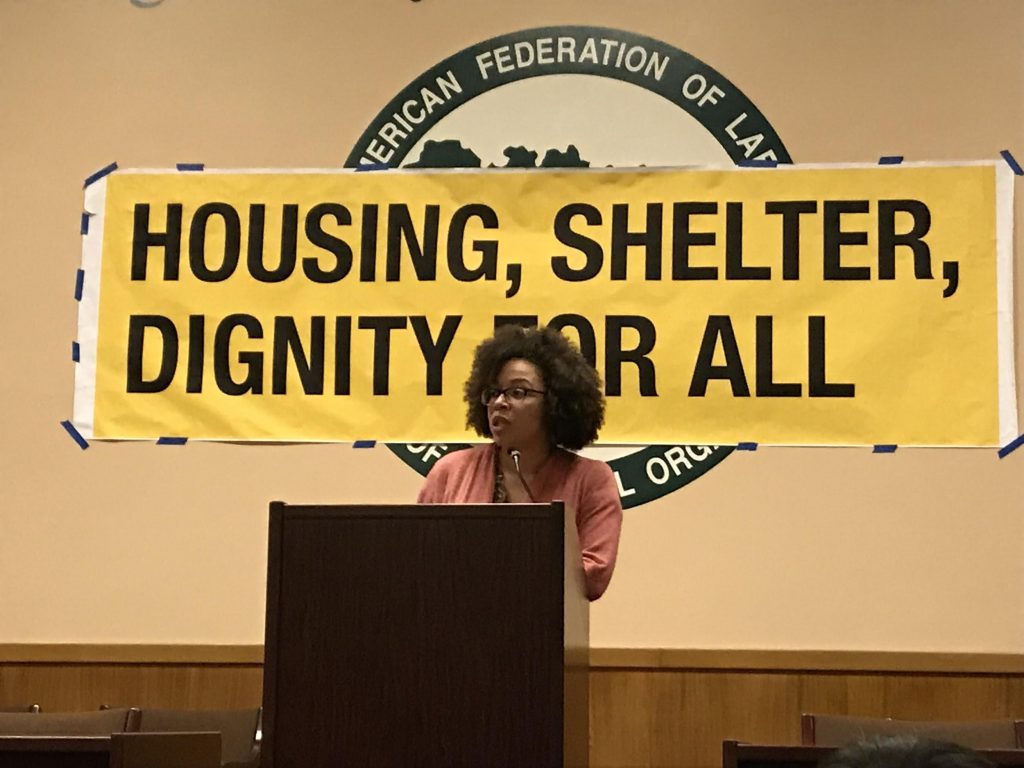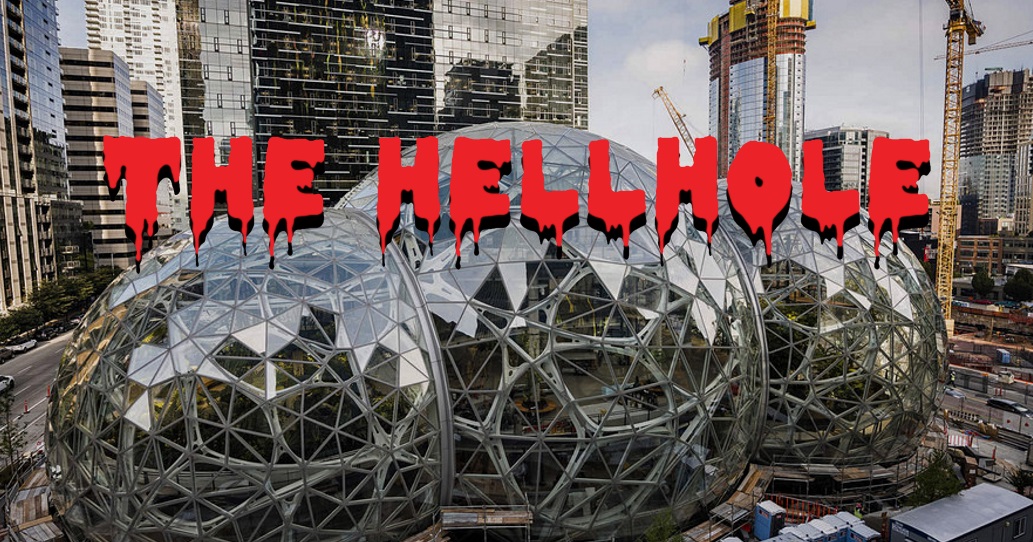Pictured above, the Amazon spheres, an ode to office work, plants from a different climate, and a constant reminder of class divide
Under capitalism workers are not people, they’re an expendable commodity that gets in the way of pure efficiency, but at least Jeff Bezos is giving a select few of them some subtropical plants to enjoy. This week in The Hellhole, we have stories on the Seattle Bus Drivers strike and the media’s pro-corporate bias. We look into the plague ravaging the city and state and why Washington’s paid sick leave bill is a little too late to help. We report back on the Housing for All coalition kick off event. And, of course, we look into the perennial class traitor Amazon and their new luxury domes that also arrive with a side of enhanced surveillance state. Welcome to the Hellhole.
School Bus Strike
When workers wield the only power they’ve got left – the power stop working – you’ll hear every excuse and argument to keep the conversation away from the actual issues at hand. If someone is making a profit, then they’ve got money enough to treat their workers right. Last month, First Student took out a full-page ad attacking its employees for daring to fight for better treatment. You might remember the bus drivers’ one-day strike back in November, after First Student decided to impose an inferior healthcare plan without bothering to negotiate it with their union, Teamsters Local 174. Clearly the company listened – and didn’t like what it heard.
Last Thursday, drivers with Local 174 took to the picket lines again:
We had some Seattle DSA parents out on the @Teamsters Local 174 picket line this morning standing with bus drivers on strike against unfair labor practices – solidarity ✊ https://t.co/OKQ3AQ3bfE pic.twitter.com/nEkCyIwQsh
— Seattle DSA? (@SeattleDSA) February 1, 2018
The Teamsters made clear that announcing strikes in advance isn’t usually their style (who doesn’t love a surprise?) but that they wanted to give parents and caregivers time to make transportation arrangements. First Student knows that if they can turn the public against the drivers, they can force them back to work without a new contract – and following a grand old tradition, they’re also offering bonuses to any scab willing to cross the picket lines.
The Seattle Times tried to cover the strike in the dignified, neutral tones of corporate media on Thursday morning, writing that “negotiations had stalled” and that First Student had made a new offer that the mean ol’ Teamsters had rejected … while failing to mention that the healthcare offered was completely unaffordable on a school bus driver’s wages.
If you’d like to help the drivers along, contact the Seattle School Board ([email protected]) and demand they fight to get the drivers a fair deal. You can also join the striking drivers on the picket lines (or just drop off some donuts and coffee) at the Lake City and South Park bus barns.
The Plague
The flu is back and it’s the worst in a decade with least 100 Washingtonians dead as a result of this year’s aggressive outbreak. Fortunately for many low-wage workers, Seattle passed a paid sick leave law in 2012 and Washington state followed suit via Initiative 1433. Unfortunately for our comrades outside the city, the law only took effect on January 1st of this year and only grants employees 1 paid hour of sick time for every 40 hours worked – not exactly enough to help if you caught this year’s bug. But as our technocratic overlords love to remind us, it could be worse.
Twenty-two states actually forbid cities and towns from mandating that employers grant workers paid time off for illness. It’s part of a rash of preemption legislation sweeping the country written by corporate lobbyists and quickly passed by their conservative enablers in state legislatures. Because apparently when you know your policies are garbage it’s easier to just do an end run around democracy and forbid people from voting for things you don’t want.
But even in places where workers have access to paid sick leave it doesn’t mean that they can afford treatment, further proof that we need a single, universal system with comprehensive coverage that is free at the point of service. The fight for universal healthcare also happens to be a campaign of DSA nationally and of Seattle DSA this year, if that’s something you want to fight for we urge you to get involved!
Housing For All Campaign Kicks Off For 2018
When we think of an emergency, we tend to imagine that things would move quickly, with people going above and beyond to do what was needed. However, Seattle has been in a homelessness State of Emergency for 27 months and our elected officials haven’t shown themselves to be up to the task, which is why the Housing For All Coalition assembled at the Seattle Labor Temple to organize around this issue and kickoff their this week.
After the Seattle City Council failed to pass the HOMES Tax last year, a year in which at least 93 people died unsheltered, their promised Progressive Revenue Task Force began meeting. The Transit Riders Union and the housing for all coalition cited tat the city needs to spend up to $400 million to get the level of affordable housing, shelter and services up to snuff to meet the scale of the crisis. The Task Force will be giving their recommendations to the city in March, and with seven of the nine members of the council coming up for election in 2019, now is the time to make sure they know who has the power in this city. Click on this link and demand that the mayor and council make the right choice and take action to tax our city’s richest corporations and get the funding we need.

Former (and future?) Seattle City Councilmember Kirsten Harris-Talley speaking at the kickoff.
Interested in helping out? Every Saturday from 1-4 TRU will also be holding action meetings at the Frye Apartments. Come by for updates on the campaign and to find out how you can get plugged in to the work that needs to be done.
Class Enemy of This and Every Week: Amazon
Corporate giant and local supervillain Amazon is at it again, as this week marked the official opening of the much-anticipated (and much-mocked) Spheres. Intended to be an alternative to the usual soul-sucking environment of office work, access to the Spheres (and all of their exotic beauty and emotional health benefits) is restricted to Amazon employees. No lanyard, no access. All of this in keeping with Amazon’s habit of using Seattle for all it’s worth without giving back to the community that helps it succeed.
Journalists and visitors were instead treated to a tour of “Understory,” an exhibit about the greatness of the Spheres and all the benefits the space will provide to employees. Only trouble is, there’s no view into the Spheres themselves from Understory. If you want to catch a glimpse of tech’s tropical paradise, you’ll have to gaze through the glass on the outside.
The Spheres take up land that could have been used to provide healthy, natural green space for the whole community and are yet another step toward transforming South Lake Union into Amazon’s own company town. If you visit them, you might as well give the glass a little stroke while you’re there.
But wait, there’s more!
Amazon has also confirmed its position as a permanent fixture at the very bottom of the sulfurous depths of the Hellhole this week with news, via Geek Wire, of recent patents on a new piece of wearable tech. The company’s new invention arrives at a time when their fourth quarter sales spiked 38% to whopping $60.5 billion.
Amazon has patented a worker-tracking wristband, likely designed to monitor the motions of workers inside their warehouses as they perform their daily under-paid labor. In addition to sending supervisors detailed information on the location of each workers’ hands relative to the items they’re picking, the device will also be able to send a jolt of electricity “haptic feedback” to any laborer whose motions fail to conform to a robotic standard of efficiency. The new innovation abandons all pretext of worker satisfaction and lays bare the fact that employing workers is only a temporary inconvenience for the bosses until total automation is achieved.
Our comrade @DelilahDeStopia, fixed the sign from the Amazon spheres tour. pic.twitter.com/HADQdrW8av
— Seattle DSA? (@SeattleDSA) February 1, 2018
Further underscoring Amazon’s problematic existence as an employer is a new study from the Economic Policy Institute, which finds that, despite promises to the contrary, there is no net increase of jobs when Amazon opens a new fulfillment center and thus, no net increase in local tax revenue. The study even seems to have found that “if anything, employment actually decreases two years after Amazon opens a fulfillment center in a county.” Yet cities and towns continue to bend over backwards by throwing every subsidy and incentive imaginable at the company that actually lowers warehouse wages in the long term.
We’re left only to wonder how soon our hyper-surveilled labor will be phased out in favor of total automation, who will share in the profits of such unprecedented efficiency? What tremendous good could be accomplished if this awe-inspiring global logistics network were socialized as a public service?
? Get involved with Seattle Democratic Socialists of America ?
Learn more about us | Come to our next meeting | Read more Hellhole
Hellhole is written by members of the Seattle DSA communications team. Unless expressly stated, Dispatches do not necessarily reflect the views of Seattle DSA as an organization or its leadership.
